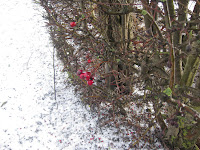 It wouldn't be Christmas without seeing the film of The Snowman at least once. When it snowed heavily last week, Neil and I made a snowman. It was nearly midnight and the air was crowded with enormous floating flakes. The children had been trying to build a snowman all week. They had managed to produce several small, scrappy specimens, but nothing resembling the kind of snowman you might want to come to life. When Neil and I realised how much snow was falling, we pulled on coats and gloves and dashed outside to the front garden. We started to build. We thought that we would just keep going until the snowman reached a decent height - slightly bigger than the children's previous efforts. But once we started, it was hard to stop. The snowman got bigger and bigger. Neighbours, looking out of their windows at the snow before going to bed, noticed us in the garden and waved enthusiastically. We waved back and carried on building. Eventually our snowman was big enough. We found him a hat and a scarf. We found him some eyes, a nose and a smile and he was finally complete. He was the first proper snowman I have ever made and I was so pleased that I ran upstairs to wake the children. It was still snowing heavily.
It wouldn't be Christmas without seeing the film of The Snowman at least once. When it snowed heavily last week, Neil and I made a snowman. It was nearly midnight and the air was crowded with enormous floating flakes. The children had been trying to build a snowman all week. They had managed to produce several small, scrappy specimens, but nothing resembling the kind of snowman you might want to come to life. When Neil and I realised how much snow was falling, we pulled on coats and gloves and dashed outside to the front garden. We started to build. We thought that we would just keep going until the snowman reached a decent height - slightly bigger than the children's previous efforts. But once we started, it was hard to stop. The snowman got bigger and bigger. Neighbours, looking out of their windows at the snow before going to bed, noticed us in the garden and waved enthusiastically. We waved back and carried on building. Eventually our snowman was big enough. We found him a hat and a scarf. We found him some eyes, a nose and a smile and he was finally complete. He was the first proper snowman I have ever made and I was so pleased that I ran upstairs to wake the children. It was still snowing heavily. 'Who wants to come outside and play in the snow?' I asked them, thinking that they would undoubtedly jump at the opportunity to fling on their wellies and cavort in the garden in the middle of the night.
 Four, very cross, sleepy children refused my offer and stumbled back to bed. Two of them deigned to look out of the window at the snowman before burying themselves under their duvets. 'Look,' I said. 'He looks just like The Snowman. Do you think he might come to life?' The snowman stood expectantly, smiling up at us, a lone figure in the unfamiliar, white landscape. The children stared at me for a moment and then exchanged a she's-completely-bonkers-let's-go-back-to-sleep look. I went back downstairs feeling disappointed. I sat in the study and watched the snowman for a while. He really looked to me as if he might come to life - well, if we had made him some legs it might have helped, but his arms and face had possibilities, it seemed. One of the wonderful things about childhood was imagining inanimate objects coming to life: imagining how fabulous it would be to be surprised. The surprises of adulthood tend not to be so fabulous - 'there's how much in my bank account?' - 'there's biro all over the new sofa?' - 'traffic wardens are about on bank holidays?'
Four, very cross, sleepy children refused my offer and stumbled back to bed. Two of them deigned to look out of the window at the snowman before burying themselves under their duvets. 'Look,' I said. 'He looks just like The Snowman. Do you think he might come to life?' The snowman stood expectantly, smiling up at us, a lone figure in the unfamiliar, white landscape. The children stared at me for a moment and then exchanged a she's-completely-bonkers-let's-go-back-to-sleep look. I went back downstairs feeling disappointed. I sat in the study and watched the snowman for a while. He really looked to me as if he might come to life - well, if we had made him some legs it might have helped, but his arms and face had possibilities, it seemed. One of the wonderful things about childhood was imagining inanimate objects coming to life: imagining how fabulous it would be to be surprised. The surprises of adulthood tend not to be so fabulous - 'there's how much in my bank account?' - 'there's biro all over the new sofa?' - 'traffic wardens are about on bank holidays?' The Snowman contains the best of childhood fantasies: parents who don't wake up - no matter how much noise you make, an inanimate object coming to life, a personal party with Father Christmas and, most wonderful of all, flying. But perhaps the reason why we enjoy these fantasies so much is because they are just that. It's cold in the snow and most children, as I discovered, don't want to get up in the middle of the night to have adventures. They would rather dream about them instead.


















